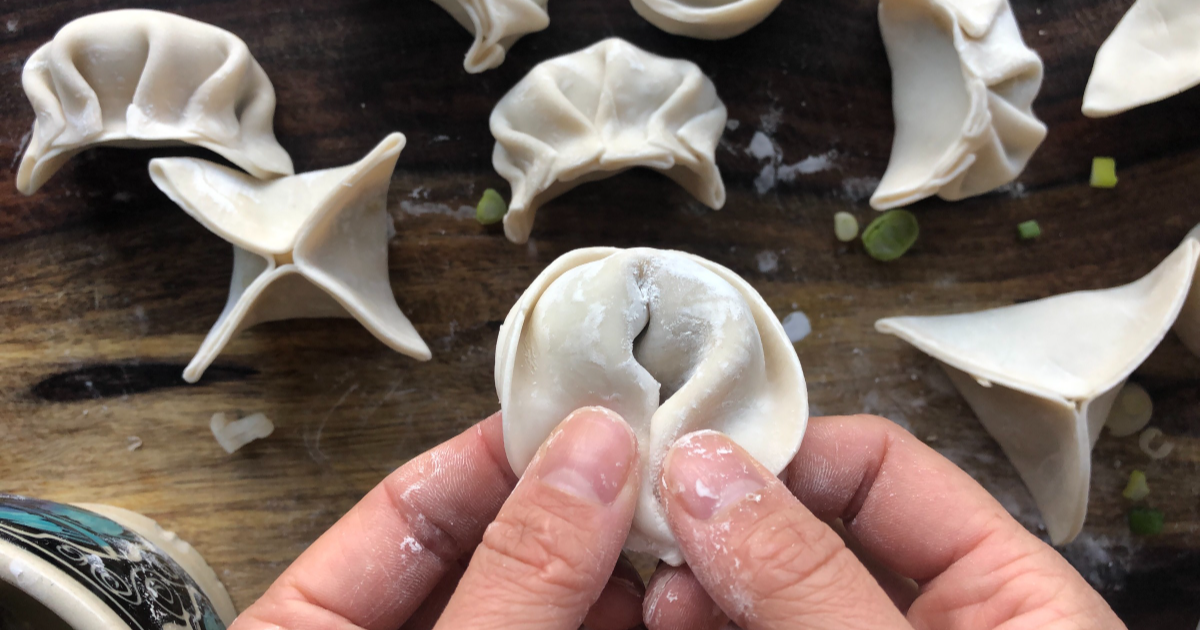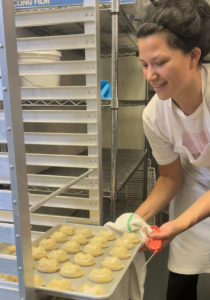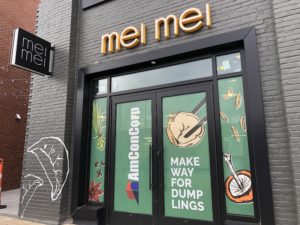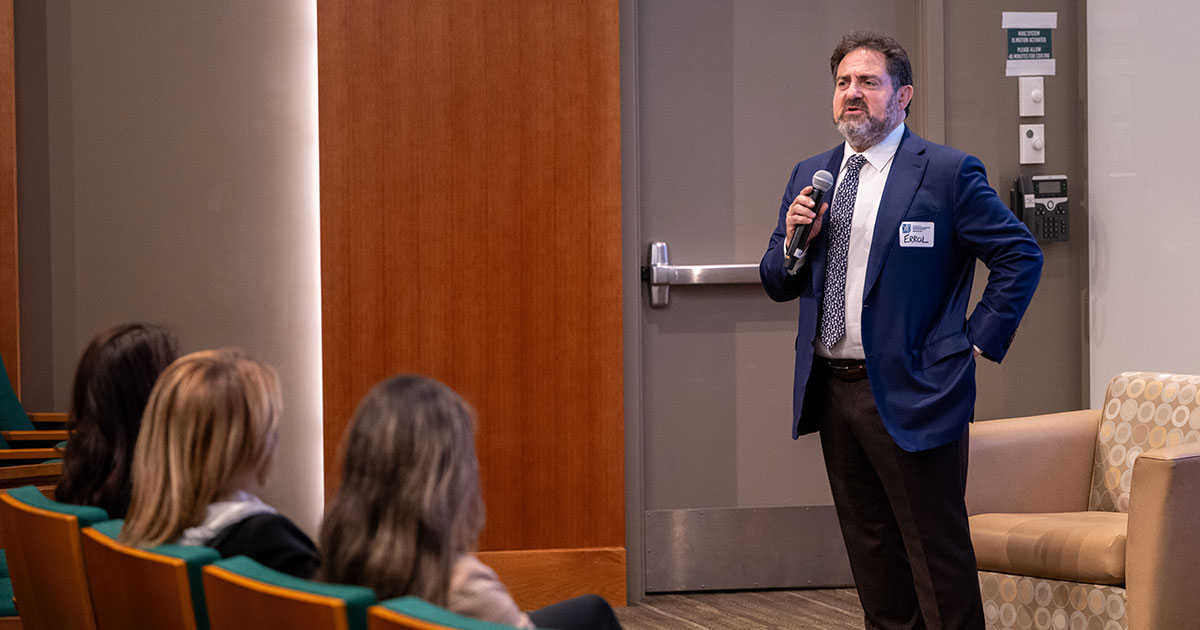Risk Takers, Problem Solvers, Dumpling Makers

Mei Mei Dumplings in Boston has been known in the food and restaurant industry as a disruptor of the status quo for quite some time. Established in 2012, the beloved business has been cared for and significantly transformed under the leadership of Irene Li and her two newest managing partners, Alyssa Lee MBA’17 and Annie Campbell MBA’17.
The business acumen that both Lee and Campbell brought from Babson College to Mei Mei allowed for the trio to take action on their biggest ideas, as well as endure and even thrive through one of the most challenging periods for a small business: the COVID-19 pandemic.

During the pandemic, Mei Mei partners Alyssa Lee MBA’17, Annie Campbell MBA’17, and Irene Li conceptualized a brand-new multipurpose dumpling factory, scheduled to open in January 2023.
Merely days before the world shut down in March 2020, an Eater article shed light not only on Mei Mei’s open-book management style, a practice that was fully developed when Lee joined the team in 2017, but it also made public all of Mei Mei’s finances as a bold display of the company’s transparent approach to leadership.
Li, who founded the business with her siblings Andy and Margaret Li, started opening the company books and discussing them with her team as a way to encourage a better restaurant industry model that could potentially gain traction beyond her business. Open-book management is not simply sharing finances with the company; it’s more about sharing ownership, responsibility, results, and growth, so everyone has a stake in the game. By using this leadership model and having all staff involved and knowledgeable about decisions that drive the strategy, they have more of a voice in the process, regardless of their role and title.
“It has impacted the business in a very positive way,” Lee said.
A Partnership Blossoms at Babson
Lee and Campbell were peers in Babson’s full-time MBA graduate program. Even though they did not have many overlapping classes in the beginning, the program’s small size made it possible for their whole class to spend a lot of time together, and inevitably, come to know each other well.

Alyssa Lee MBA’17 prepares the day’s dumplings.
“There were a few key moments,” Lee said about the pair’s friendship and business relationship forming. “Annie was a great business problem solver—she had a reputation among our class of being extremely smart.”
One key moment was a class weekend trip planned by the Graduate Student Council (GSC), which Lee led as the president. She tapped Campbell to be the master organizer—find the right hotel, book all of the rooms, keep track of payments, etc.
“The hotel manager said her spreadsheet was the most organized that anyone had ever given them,” Lee said.
Since then, the two of them “project dated” until their paths officially aligned when Campbell joined Mei Mei as a full-time managing partner in 2020, the fateful year that changed the trajectory of their business in a big way.
Through Uncertainty, Opportunity
Lee and Campbell shared how they helped pivot the business model from a brick-and-mortar, traditional restaurant business to a dumpling to-go business.
The pandemic forced the pair to rethink the model and was the catalyst to a team-wide, design-thinking challenge, an idea born from Lee’s and Campbell’s design-thinking experiences at Babson. As a result of the challenge, the business became much less about a physical space, and much more about how to get their tasty product into the hands (and mouths) of Mei Mei dumpling lovers statewide, whether from their headquarters in Boston, farmers markets across the state, or soon, the shelves of your local grocery store.

Mei Mei’s new dumpling factory at Iron Works in South Boston will include a dumpling factory, cafe and classroom.
Another result of their design thinking was a new multipurpose headquarters—including a dumpling factory, cafe, and classroom—which opens at Iron Works in South Boston in January 2023. This leap gives them the opportunity to expand into wholesale dumpling distribution, open a classroom space, and serve up hot dumplings in their own cafe space. Investing in this massive new space also meant they had to take the plunge with the right equipment: A $45,000 dumpling machine that would help them efficiently produce wholesale-level quantities. For Lee and Campbell, this machine serves as a symbol of their will to thrive, rather than simply survive.
“I’m proud of us, for pushing for that, getting it up and running, and experiencing all of this change,” Campbell said.
Sharing an MBA Education to Help Others Grow
The open-book management system that Mei Mei embraces with the entire team gives staff the knowledge and opportunity to understand the “why” behind the price of their menu items, and when they’re able to see the cost of every operating expense, ingredient, and labor tied to it. Not only can they understand the reason, but they also can contribute to the decisions made, whether it’s which days they will be open or how many dumpling flavors will be on the cafe menu.
This system was developed over a couple of years, and both Campbell and Lee can attest that the “mini-MBA” curriculum they have built for their staff—lessons on cost of goods sold, direct labor, revenue breakdown—is a testament to the education they earned at Babson.

The new space will serve hot dumplings, prepared dumplings, and workshops to learn how to make your own.
They took everything they knew about their business model, and everything they learned from their MBA experience at Babson, and turned it into a valuable tool for their entire Mei Mei team.
Of course, bringing this type of curriculum to your workforce begins with your education, and both Campbell and Lee agree that they would not be where they are today without their Babson MBA. For some, the vision of starting their own business is clear, and Babson is one essential step in the process. But, for others, simply surrounding yourself with the spirit of entrepreneurship in the right environment and keeping an open mind is the key to future success, whatever that may look like.
“You learn so much simply by being open with your group of graduate peers and professors,” Campbell said. “So many opportunities will come—learning, professional, personal opportunities. They all help you grow, and that’s what it’s about. Growing in experience, and growing in ability.”




